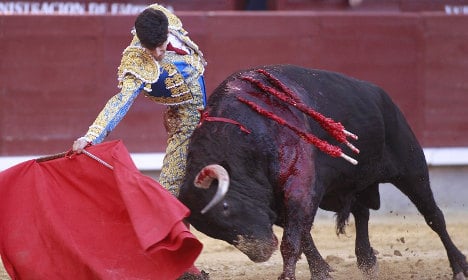As debate rages as to the future of bullfighting in Spain, the mayor of its third largest city proposed doing away with the tradition in favour of “bullfighting light”.
Joan Ribó, the left-wing mayor from the Podemos backed regional Compromís party, suggested that Valencia consider adopting the Portuguese style of corrida, which ends the confrontation between man and beast before the inevitable sword through the heart of the bull.
Such a “synthesis” would preserve the cultural traditions of the fiesta yet still respect the animal’s life, the mayor said at a conference on Monday, the day after thousands of aficionados took to the streets of Valencia to show their support for Spain’s “national fiesta”.

Thousands turned out for the pro-bullfighting rally in Valencia. Photo: AFP
Bullfighters joined the ranks of some 10,000 bullfighting supporters on Sunday to demand that their passion be given “cultural protection”.
But the mayor of Valencia insisted it was time Spain reconsidered staging public festivals that involved cruelty to animals.
“There are more and more people understanding that mistreating animals is a practice that must be eradicated from our society,” explained Ribó in comments reported widely in the Spanish press.
“I think it could be interesting if we in Spain could find a way in which the bulls did not get that final treatment (in the ring),” he said.
However, animal rights activists insisted that even the Portuguese style of bullfighting was cruel and just prolonged the “agony and torture” of the bulls, which are usually slaughtered by butchers outside the bullring after the fight.
Pacma, a political party campaigning for animal rights flatly rejected the suggestion that “no kill bullfights” was a step forward.
“The mayor fails to recognise that the bulls are still stabbed with the barbed darts (banderillas) before being eventually killed out if sight of the public, thus prolonging their agony,” said a statement from Pacma to The Local.
“The only acceptable proposal is to ban all kinds of anachronistic spectacles that provides entertainment based on cruelty to animals.”
Support for bullfighting has been on the wane in Spain in recent years but thousands of local festivals which stage taurine activities still take place across the country each year.
According to a recent survey by Spain’s Ministry of Culture, just 8.5 percent of Spaniards go to a bullfight annually.
Six years ago the regional Catalan government banned 'corridas' or bullfighting in the region.
Some cities newly run by leftist administrations, including Madrid and Valencia, also recently cut subsidies for bullfighting.
In Portugal killing a bull in the ring was outlawed in 1928 yet bullfighting still remains popular, although bullfighters there complain about being denied the final kill.
“Bullfighting in Portugal is like a play with the ending missing,” Portugal’s most famous bullfighter Pedrito de Portugal told the New York Times after being fined €100,000 for killing a bull in the ring in 2007.
“Killing the bull is an art, and the way we do it in Portugal deprives the bull of his dignity,” he said.



 Please whitelist us to continue reading.
Please whitelist us to continue reading.
Member comments